More than 7,600 tons of trash pile up in Paris: ‘There was garbage even near the Eiffel Tower’
Rubbish is mounting up on the streets of the French capital as municipal workers strike against the government’s plan to raise retirement age from 62 to 64 by 2030
A few meters from Notre Dame cathedral in Paris, lies the charming Latin Quarter. The area is made up of narrow streets, and filled with bookstores, shops, restaurants and cafés that attract both locals and tourists. But for the past few days, the sidewalks have been covered in trash bags, with some piles of garbage reaching up to two meters. The situation has also been seen in other areas of the French capital, where more than 7,600 metric tons of trash lie uncollected on the streets, according to Paris City Council. The rubbish pile-up is due to a public workers strike against the French government’s pensions reform plan, which seeks to raise the retirement age from 62 to 64 by 2030. Thursday is a crucial day for the bill, which will go to a final vote in the National Assembly.
“It’s crazy. We shouldn’t have this in Paris. I didn’t have any customers today,” complains a waiter of a French restaurant in Paris. While preparing the tables in the hope of attracting a tourist, he says that he has decided to keep bags of garbage in the basement until the situation is resolved. Meanwhile, trash is piling up a few meters from the door, bringing rats and the stench of garbage.
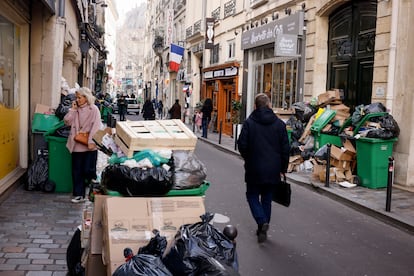
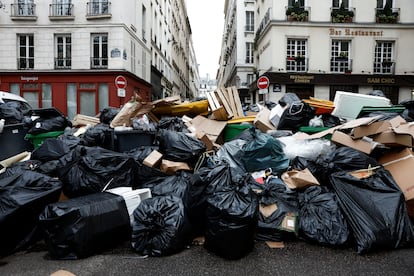
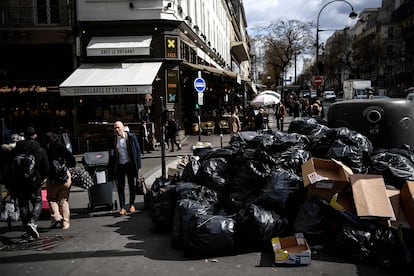
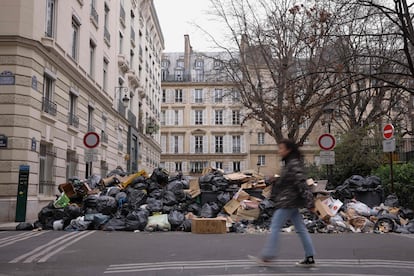
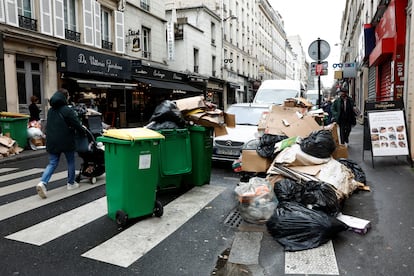
In the adjoining building, there were so many trash bags piled up, people could not even enter, says Lucette Valensi, 86. When she realized that the bags were blocking the doorway, she called the police and the fire brigade, and managed to get the authorities to clear the entrance. Despite these problems, Valensi fully supports the strikers. “Most of the population is against [the pension reform],” she says. “Even so, they keep going,” she adds, referring to the government’s refusal to back down.
On a nearby avenue, Honduran tourists Fernando Portillo and Alicia Morales say they are visiting Paris for the first time. Although they are enjoying the trip, they admit that the mounds of trash “have killed the view a bit.” “There was even garbage near the Eiffel Tower,” says Portillo. On one corner, a sign stuck to a pile of trash bags asks for any new garbage to be placed further up near the quays of the Seine River.
French President Emmanuel Macron is planning to raise the retirement age from 62 to 64 by 2030, and change the rules so that people need to have worked for at least 43 years to get a full pension. The reform has sparked mass strikes and protests across the country. Thousands of people demonstrated again on Wednesday, marking the eighth day of protests since the movement began in January. According to polls, two out of three French people oppose the reform, although, paradoxically, most think it will be approved.
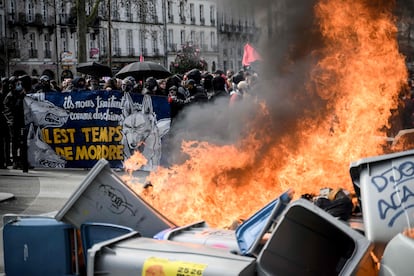
Time is running out. On Wednesday, a group of lawmakers and senators approved the final version of the bill, which will be put to a final vote on Thursday in the National Assembly. The government lost its absolute majority in the lower house in the June legislative elections, meaning it will need the votes of the right-wing Les Républicains party to get the bill passed. If it is not approved, Macron could instead use his special constitutional power under Article 49.3 to force the bill through parliament without a vote.
“People are complaining now that there are rats; we see them every day”
Even if the bill is passed, the protests are set to continue. Unions in France have stepped up their actions with ongoing strikes in key sectors such as energy and garbage collection. Three incineration plants located at the gates of Paris have been brought to a halt, and the strikers of France’s national trade union CGT voted on Wednesday to continue striking “until at least March 20.″
In Ivry, in the southeast of Paris, Sebastien Szhutt, 47, says he has been collecting garbage for two years, and cannot imagine waiting longer to retire. “It is very physical and tiring work. We are always outside, even if it rains, snows or it is very hot,” he explains. “People are complaining now that there are rats, but we see them every day.” Public workers are responsible for garbage collection in half of Paris; the other half is managed by private companies. As a result, the neighborhoods managed by the municipal teams have been most affected by the strikes. On Tuesday, Minister of the Interior Gérald Darmanin asked Paris Mayor Anne Hidalgo to “requisition” enough resources to get the trash off the streets. If Paris City Council does not take action, the state will, he warned.
“After eight years [working as garbage collectors] we are broken,” says Laurent Provost, 56, who also went to the Ivry plant to support the protest. It’s not just about picking up the trash bins, he explains, but also collecting all the rubbish that’s on the street, which involves constantly bending over: “There are bags that weigh almost as much as me.”
Sign up for our weekly newsletter to get more English-language news coverage from EL PAÍS USA Edition
Tu suscripción se está usando en otro dispositivo
¿Quieres añadir otro usuario a tu suscripción?
Si continúas leyendo en este dispositivo, no se podrá leer en el otro.
FlechaTu suscripción se está usando en otro dispositivo y solo puedes acceder a EL PAÍS desde un dispositivo a la vez.
Si quieres compartir tu cuenta, cambia tu suscripción a la modalidad Premium, así podrás añadir otro usuario. Cada uno accederá con su propia cuenta de email, lo que os permitirá personalizar vuestra experiencia en EL PAÍS.
¿Tienes una suscripción de empresa? Accede aquí para contratar más cuentas.
En el caso de no saber quién está usando tu cuenta, te recomendamos cambiar tu contraseña aquí.
Si decides continuar compartiendo tu cuenta, este mensaje se mostrará en tu dispositivo y en el de la otra persona que está usando tu cuenta de forma indefinida, afectando a tu experiencia de lectura. Puedes consultar aquí los términos y condiciones de la suscripción digital.









































